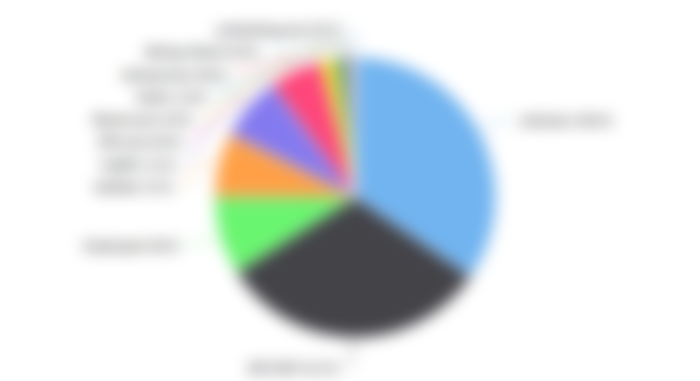According to BTC.com data, these five mining pools rank among the top 7 in BCH computing power, with the total computing power exceeding 51%, reaching 54.5%, and possessing considerable speaking power.

After listening to the community's opinions, Jiang Zhuoer and Roger Ver re-clarified that this plan is only "proposed", and there is still room for discussion on the details of the "plan". Whether to implement it or not can be determined by means of voting by computing power.
But the big coal miners' "alliance" has been formed, and most small and medium miners are unlikely to have a say.
"The Solitary Alliance"
"There are three major elements of the public chain battle: money, technology, and users. The technology battle does not happen overnight, but money can stand out."
Indeed, without money, it means that the underlying technology of the public chain is difficult to develop and it is also unattractive to developers of the upper ecosystem. In order to avoid the development of broken grain and further strengthen the ecology, there is no doubt that the public chain cannot do without continuous financial support.
In addition to large one-time fundraising, there are two models that can bring "cash flow" to the public chain. One is a block reward model similar to Dash and Zcash (also known as a "tax-extraction" mechanism), and the other is a Tezos-like inflation reward model. The "plan" proposed by Jiang Zhuoer and others belongs to the first category.
The "Plan" mentions that while BCH is upgrading on May 15 this year, it will start a 6-month block reward donation. The donation part accounts for 12.5% of the BCH block reward. Based on the current US $ 300 per BCH, the value of the donated funds in 6 months can reach US $ 6.07 million.
To ensure the participation of the BCH mining pool, the "Plan" stated that "We will be alone in BCH blocks that are unwilling to follow the plan."
In the SHA-256 mining algorithm, if a block does not belong to the longest chain, it is called an "orphan block"; an orphan block is meaningless, and miners who find this orphan block will not get any block reward.
In this "plan", the term "solitary block" is used as a verb, which means that once the plan is "implemented", the "plan" initiated mining pool will have a certain computing power advantage to jointly exclude those that are not " Donate ”the mining pool so that it cannot join the longest chain and get the corresponding block reward. In order to achieve this goal, the collaborators have also been referred to by some netizens as the "Orphaned Alliance."
The Plan also disclosed that a Hong Kong company (in the form of a fund) has been set up to accept and allocate funds, and the funds will be used to pay for development costs.
Regarding activating this feature at the time of the protocol upgrade, "Plan" said that it will help ecosystem participants to promote it in a consistent manner. Of course, this also means preparing your code for testing and deployment as soon as possible. "We will work with multiple BCH nodes to join the code and promote this program as part of the May 2020 agreement upgrade."
In addition to the "plan" content, Jiang Zhuoer, who is responsible for publishing, also proposed his own ideas on the donation process:
Before the start of the miner donation plan, the BCH Miner Fund will be established and accept donations from miners, as well as donations from non-miner individuals and companies. The foundation will run for a while and let the community see the effect. The foundation's decision power will be voted by the donor in proportion to the donated funds (those who do not want to vote can abstain).
Support miners to donate directly to development projects. For example, miner X can send n% of the output to the address of project A, and m% of the output to the address of project B. If the miner does not know which project to donate to, he can donate to the foundation, or refer to the fund's distribution ratio and donate directly to each project.
What if some miners feel that all projects are bad, don't want to donate, or don't accept donations? In order to avoid the "tragedy of the commons", he has the right to send this part of the output that should be donated to the black hole address to permanently destroy these coins-this is essentially donating these coins to all BCH holders.
800 BCH are difficult to gather, the "tragedy of the commons" developed by the public chain
After the "plan" was released, it aroused heated discussions within and outside the community.
"It should have been so long ago!" Many BCHer cheered in various communities.
Most currency holders and miners agree with the starting point of this "plan"-to continuously raise funds for public chain development.
Just in the middle of last year, BCH developers had problems raising funds.
On May 30, 2019, BCH organizations such as Bitcoinincash.org launched a total of 800 BCH (about $ 350,000) to support the continued operation of the development team.
"The 800 BCH raised this time is for the current needs of developers. This is the first phase. After that, we will also seek stable and continuous financial support. I am afraid that before the BCH Development Foundation finds a long-term funding source, I am afraid It all depends on fundraising, "said David R. Allen, one of the sponsors.
Unexpectedly, as long as the long-term fundraising plan started, it was poured with cold water.
Half a month after the fundraiser was launched, Cryptopotato reported that the BCH Development Foundation had raised only 43% of the target amount. It wasn't until some developers cried in the forum that the fundraising funds were doubled. But for developers, what will happen next time fundraising is unknown.
As with other decentralized communities, BCH developer funding faces an inefficient and unsustainable situation. This "plan" obviously needs to solve this problem thoroughly in a relatively long period of time.
"Although there are some disputes among all miners for donating developers, it is undoubtedly a better solution than donating developers to a few companies. Adequate donation funds will help speed up the development of BCH and quickly achieve the roadmaps such as avalanches Development Plan."
The "Plan" also revealed a "urgency", bluntly BCH should seize the window before the arrival of the bull market to give developers plenty of food and grass to accelerate the development of BCH and user growth.
Concerns about a hash power dictatorship
Opposition is focused on the form of implementation of the Plan.
"The donation is not terrible. The terrible thing is that the four can agree to implement it." In the words of a netizen.
There are two kinds of crises hidden in it. The "solitary league" has too much computing power (power) and is arbitrary.
A BCH bluntly stated on the forum, "These mining pools (intended to be) backed by computing power, exclude uncooperative blocks, (ie, modify the agreement in a substantial sense, so that each block of new coins has a Copies directly or indirectly to the team. This solution will change the fundamental nature of BCH: from a fully open public chain to a semi-private chain of ambiguous nature that divides some of the new coins into the hands of specific people in the agreement. Some people may I think this is a last resort plan for survival. Considering the long-term promotion, investment, and talent demand, we don't really understand whether it is cost-effective ... The mining pool is forced to redistribute coins with computing power. I do n’t know the same allocation Can a person collect taxes on any currency and any transaction on the chain, as long as he has done public relations, there is no taboo. "
On January 25, Bitcoin.com issued an announcement saying that the "plan" is still being developed. The proposed changes will not take effect until May 2020, and there will be sufficient time to allow as many parties as possible to discuss a solution. The chain will not be split due to protocol changes. If most miners are inefficient, infeasible or otherwise detrimental to BCH or its business, miners may choose to terminate the fund.
In an updated blog post, Jiang Zhuoer called for a public vote on the implementation of the Plan.
"I hope to complete a 3-month miner vote (possibly using bmp.virtualpol.com to vote). If 2/3 of the hashrate vote in favor of the donation, I hope the developer can write the donation plan into 2020 The May version upgrade, if it is too late, write the November 2020 version upgrade, and the donation will continue for 6 months until the next upgrade, "Jiang Zhuoer wrote.
However, once the big miners have formed an "alliance", most medium and small miners are unlikely to have a say.
"From the perspective of professional miners, this is indeed difficult to accept, because the miners' net profit is already low enough. Miners who do not reinvest their profits are thrown away in fierce competition, which will inevitably shrink market share. More importantly, the motivation of miners is often inconsistent with our needs (pursuing the benefits of the future). If there is no longing for the future of BCH, there are not many reasons to care about the development of BCH. Relevant.
Even if some miners are willing to make sacrifices for long-term benefits, in the short term, miners will face successive challenges of halving block rewards and paying 12.5% of "tax" on the basis of small profits. A netizen suggested that if the computing power is reduced sharply, it will also pose a hidden danger to the security of the BCH network.
If the "plan" is successfully implemented, some BCHers are already thinking "Will there be a public chain to follow suit".
However, observing the particularity of BCH, we can see that it may be difficult for other public chains to implement it.

I hope you don't think miners are paying any of it? The $6 millions come from newly minted coins that were meant to go for securing the chain but might now be redirected towards development.